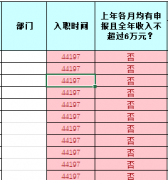问题描述
我正在编写允许用户下载文件的 PHP 脚本.基本上这个想法是为了防止文件被下载超过 X 次,因为它是付费内容,链接不应该被传播.
I'm writing a PHP script that allows the user to download a file. Basically the idea is to prevent the file being downloaded more than X times, since it is paid content, and the link should not be spread around.
由于文件会很大,所以最好实现恢复.我已经阅读了标准,但它是很长,并允许一些灵活性.由于我需要快速完成它,我更喜欢此功能的稳定、经过测试的实现.
Since the files will be pretty large, it should be good to implement resuming. I've read the standard, but it's pretty long and allows for some flexibility. Since I need to get it done quickly, I'd prefer a stable, tested implementation of this feature.
谁能告诉我这样的脚本?
Can anyone point me to such a a script?
推荐答案
似乎我自己找到了我需要的东西.为了让其他人可以从中受益,这里是链接:http://www.coneural.org/florian/papers/04_byteserving.php
Seems that I found what I needed myself. So that other may benefit from this, here is the link: http://www.coneural.org/florian/papers/04_byteserving.php
以防万一原始页面停止工作(脚本已经很旧了),这里是它的副本:
And just in case the original page stops to work (the script is pretty old already), here is a copy of it:
<?php
/*
The following byte serving code is (C) 2004 Razvan Florian. You may find the latest version at
http://www.coneural.org/florian/papers/04_byteserving.php
*/
function set_range($range, $filesize, &$first, &$last){
/*
Sets the first and last bytes of a range, given a range expressed as a string
and the size of the file.
If the end of the range is not specified, or the end of the range is greater
than the length of the file, $last is set as the end of the file.
If the begining of the range is not specified, the meaning of the value after
the dash is "get the last n bytes of the file".
If $first is greater than $last, the range is not satisfiable, and we should
return a response with a status of 416 (Requested range not satisfiable).
Examples:
$range='0-499', $filesize=1000 => $first=0, $last=499 .
$range='500-', $filesize=1000 => $first=500, $last=999 .
$range='500-1200', $filesize=1000 => $first=500, $last=999 .
$range='-200', $filesize=1000 => $first=800, $last=999 .
*/
$dash=strpos($range,'-');
$first=trim(substr($range,0,$dash));
$last=trim(substr($range,$dash+1));
if ($first=='') {
//suffix byte range: gets last n bytes
$suffix=$last;
$last=$filesize-1;
$first=$filesize-$suffix;
if($first<0) $first=0;
} else {
if ($last=='' || $last>$filesize-1) $last=$filesize-1;
}
if($first>$last){
//unsatisfiable range
header("Status: 416 Requested range not satisfiable");
header("Content-Range: */$filesize");
exit;
}
}
function buffered_read($file, $bytes, $buffer_size=1024){
/*
Outputs up to $bytes from the file $file to standard output, $buffer_size bytes at a time.
*/
$bytes_left=$bytes;
while($bytes_left>0 && !feof($file)){
if($bytes_left>$buffer_size)
$bytes_to_read=$buffer_size;
else
$bytes_to_read=$bytes_left;
$bytes_left-=$bytes_to_read;
$contents=fread($file, $bytes_to_read);
echo $contents;
flush();
}
}
function byteserve($filename){
/*
Byteserves the file $filename.
When there is a request for a single range, the content is transmitted
with a Content-Range header, and a Content-Length header showing the number
of bytes actually transferred.
When there is a request for multiple ranges, these are transmitted as a
multipart message. The multipart media type used for this purpose is
"multipart/byteranges".
*/
$filesize=filesize($filename);
$file=fopen($filename,"rb");
$ranges=NULL;
if ($_SERVER['REQUEST_METHOD']=='GET' && isset($_SERVER['HTTP_RANGE']) && $range=stristr(trim($_SERVER['HTTP_RANGE']),'bytes=')){
$range=substr($range,6);
$boundary='g45d64df96bmdf4sdgh45hf5';//set a random boundary
$ranges=explode(',',$range);
}
if($ranges && count($ranges)){
header("HTTP/1.1 206 Partial content");
header("Accept-Ranges: bytes");
if(count($ranges)>1){
/*
More than one range is requested.
*/
//compute content length
$content_length=0;
foreach ($ranges as $range){
set_range($range, $filesize, $first, $last);
$content_length+=strlen("
--$boundary
");
$content_length+=strlen("Content-type: application/pdf
");
$content_length+=strlen("Content-range: bytes $first-$last/$filesize
");
$content_length+=$last-$first+1;
}
$content_length+=strlen("
--$boundary--
");
//output headers
header("Content-Length: $content_length");
//see http://httpd.apache.org/docs/misc/known_client_problems.html for an discussion of x-byteranges vs. byteranges
header("Content-Type: multipart/x-byteranges; boundary=$boundary");
//output the content
foreach ($ranges as $range){
set_range($range, $filesize, $first, $last);
echo "
--$boundary
";
echo "Content-type: application/pdf
";
echo "Content-range: bytes $first-$last/$filesize
";
fseek($file,$first);
buffered_read ($file, $last-$first+1);
}
echo "
--$boundary--
";
} else {
/*
A single range is requested.
*/
$range=$ranges[0];
set_range($range, $filesize, $first, $last);
header("Content-Length: ".($last-$first+1) );
header("Content-Range: bytes $first-$last/$filesize");
header("Content-Type: application/pdf");
fseek($file,$first);
buffered_read($file, $last-$first+1);
}
} else{
//no byteserving
header("Accept-Ranges: bytes");
header("Content-Length: $filesize");
header("Content-Type: application/pdf");
readfile($filename);
}
fclose($file);
}
function serve($filename, $download=0){
//Just serves the file without byteserving
//if $download=true, then the save file dialog appears
$filesize=filesize($filename);
header("Content-Length: $filesize");
header("Content-Type: application/pdf");
$filename_parts=pathinfo($filename);
if($download) header('Content-disposition: attachment; filename='.$filename_parts['basename']);
readfile($filename);
}
//unset magic quotes; otherwise, file contents will be modified
set_magic_quotes_runtime(0);
//do not send cache limiter header
ini_set('session.cache_limiter','none');
$filename='myfile.pdf'; //this is the PDF file that will be byteserved
byteserve($filename); //byteserve it!
?>
这篇关于PHP中是否有很好的实现部分文件下载?的文章就介绍到这了,希望我们推荐的答案对大家有所帮助,也希望大家多多支持跟版网!



 大气响应式网络建站服务公司织梦模板
大气响应式网络建站服务公司织梦模板 高端大气html5设计公司网站源码
高端大气html5设计公司网站源码 织梦dede网页模板下载素材销售下载站平台(带会员中心带筛选)
织梦dede网页模板下载素材销售下载站平台(带会员中心带筛选) 财税代理公司注册代理记账网站织梦模板(带手机端)
财税代理公司注册代理记账网站织梦模板(带手机端) 成人高考自考在职研究生教育机构网站源码(带手机端)
成人高考自考在职研究生教育机构网站源码(带手机端) 高端HTML5响应式企业集团通用类网站织梦模板(自适应手机端)
高端HTML5响应式企业集团通用类网站织梦模板(自适应手机端)